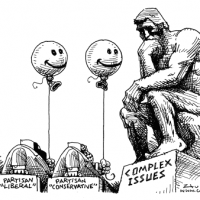Imagine a world where human beings weren’t susceptible to diseases, where we were all strong and smart, where we couldn’t feel pain and could be put in a state of ecstasy due to things which today produce only mild excitement. Imagine a world where human beings could fly of their own volition, where we have…
Posted on January 9, 2012
In agency, consciousness, ethics, by Greg
Cognitive Philosophy is excited to host the January 9th edition of the Philosophers’ Carnival! The Philosophers’ Carnival is a roaming showcase for the best philosophy blog posts of each month. The entries in this edition span topics in mind, agency, ethics, language and more. Enjoy the show!
I’ve been thinking recently about relationship between politics and economic policies on the one hand, and what we know about human psychology and the causes of human behavior on the other. More specifically, I’ve been thinking about how the knowledge which we learn from research in the cognitive sciences is too often neglected, distorted, or…
Imagine we live in a world where you can go to a clinic and choose to have certain memories wiped away, erased forever. Think of all the terrible memories you have accumulated in your life, and about the prospect of them never being able to force themselves on your consciousness ever again. Would you go…
What does it mean to be a victim of circumstances? What is the difference between people who take personal responsibility for their lives, and those who seemingly choose not to? Is it possible for us to live in a world where people consistently actualize their potentialities? And most importantly, what ways of thinking about human behavior will allow the last question to come to fruition?
Posted on January 6, 2011
In agency, consciousness, ethics, by Greg
I’ve written about free will a few times on this blog, and anyone who’s familiar with these writings will know I’m very critical of most conceptions of free will (Link 1, Link 2). And yet I also feel like we often are missing something really important when engaging in this debate. Let’s not forget what…







